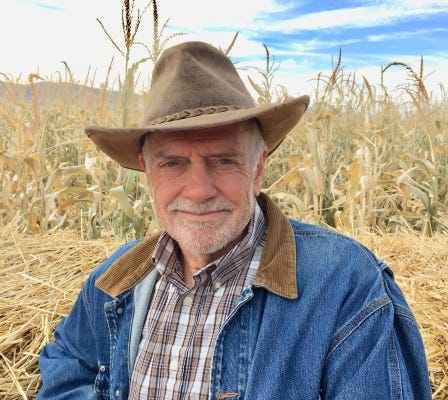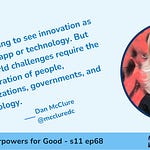Devin: Warner, what is your superpower?
Warner: I don't have stuff like that. I avoid superhero movies, or my grandkids want me to go see that stuff. I say that's all fake. I don't think there's any kind of superpower I have.
Devin: What makes you successful?
Warner: Well, I suppose I'm a disruptor. I'm a change agent. I tell my classes at the beginning of every semester, “You're not here to call me Dr. Woodworth or Heir Professor or Brother Woodworth in the Mormon Church. Just call me Warner. I'm a student like you. We're all scholars; we’re all trying to learn together.”
“And I'm going to try to disrupt your paradigm and challenge your assumptions. And I'm going to hope as a renegade, I kind of shake you up a bit—and be a catalyst to help you find a more authentic life and a great future that's not going to be just a job—because that's not enough during your 60, 70, 80, 90 years on this earth. I want you to figure out how you can be an agent for transformation. And I'm here to help empower you to do that. And hopefully, we can together build a sense of community.”
So those kinds of values and those kinds of motivations, along with a huge component of high ethics and commitment to social justice and peace. Those are the values that are pretty much burned into my brain and my heart.
You can watch the full interview with Warner here: warner.s4g.biz.
Warner Woodworth is not your typical business school professor, much less what you’d expect from Brigham Young University’s Marriott School of Management. A champion of the underserved, he’s spent his career teaching students and helping others to build social enterprises and nonprofit organizations. He has a genuine disdain for greed.
Over his career, he has helped form dozens of nonprofits and social enterprises, including Unitus, one of the early players in microfinance. He advocated for making loans to women with no income in remote and rural locations around the world before he heard of or befriended Nobel Laureate, Muhammad Yunus.
By way of an example, he shares the story of Maria, a woman in Honduras who was part of a group of women whose lives and livelihoods had been devastated by Hurricane Mitch in 1998. He helped them organize a microloan fund. When presented with the cash for a $100 loan to help her start a small personal business, she responded crying that she wasn’t “worthy.” She didn’t believe she could pay it back. “I’ve never seen so much money,” she said.
Warner believed in Maria. With tears in his eyes, he said, “You can do this. We love you. We trust you. We know this will work.”
Maria accepted the funds and launched a small chicken farm, initially with 12 chickens. Within a year, she had 5,000 chickens. She was worthy. She was capable. He saw it before she did, but she was the one who executed well and performed the transformation.
Warner teaches his students to use disruption to become “positive deviants.” He says that the folks he has helped create microfinance companies have funded 20 million businesses, about 99 percent founded by women. The borrowers overwhelmingly repay their loans. Disruption works.
How to Develop Disruption as a Superpower
Warner says you have a choice. You can stay on the freeway with a successful American life, recycling and reciprocating conventional wisdom, or you can make a definitive decision to shake up the status quo.
Warner joined me for a follow-up conversation mainly focused on how you can learn disruption. You can watch it here: woodworth.s4g.biz. [Links to the video recording of the podcast episode posted here.]
No matter what other strengths you may have, you can add some disruption to increase the impact of what you’re doing. Here are the seven tips that Warner shared for learning to be a positive deviant.
1. Shake up the status quo. Something about the situation you are in is not working, or you wouldn’t want to change it. To change outcomes, it is likely you need to change the system. Warner says, “I started my career with an explicit goal to shake up the status quo.” He didn’t want to make tweaks; he wanted to make a difference. That’s a worthy goal.
2. Start bottom-up. While Warner acknowledges that large NGOs from the Federal Government to the Gates Foundation do great work, it is difficult to disrupt what’s happening there. At the bottom, in the urban streets or jungle trails into villages, are opportunities to help people in entirely new and novel ways.
3. Innovate. “Do something innovative and a little crazy,” he says. Conventional wisdom often seeks to replicate what works. Warner says disruptors start something new, bring a fresh approach or see a problem that others have ignored.
4. Start small. One of the patterns Warner cautions against is the desire to start something at scale. He says it is critical to prove the concept works before you begin to scale. He often helps those he mentors find a donor or build a small advisory board to help fine-tune the plan. The team of backers and doers still fit in one living room.
5. Pace your growth. One of Warner’s efforts is helping several worker-owned businesses in the Basque region of Spain, which have become some of the most successful in Europe. They told him, “We build the road as we travel.” This observation is good guidance for growing your impact-oriented effort. You want to be sure not to get too far out in front of the people you hope to help.
6. Gather data. Another critical step, the professor says, is to be sure to document your progress and record your data. Records will help you attract additional support as you demonstrate the impact of your work. Ultimately, you are doing this to make a difference in the world. It is wise to begin measuring the difference you make from the earliest days.
7. Hire locals. As you scale up the operation, one of your priorities should be hiring local people in the community within the country to lead the effort. Your goal should be to create a home-grown operation that you support rather than an international operation with foreigners imposing their will on vulnerable communities.
Warner makes clear that his advice doesn’t apply only to traditional students. He notes that many people today are discovering in their 50s that they can retire and have the longevity to expect to live into their 90s, giving them 20 to 30 years of productive post-employment opportunity.
“You don't need to stay in this big mansion. You don't need to live in a luxurious condo. You don't need to check your income every day and look at increased revenues. You can think about finding new purpose, a kind of a purpose-driven life,” Warner says. “You could consider doing something radically different and have a whole new life, kind of like a rebirth for the next 20, 30 years.”
In other words, you can start by disrupting your own life.
This is a sample chapter from my book, Superpowers for Good.























This Emeritus BYU Professor Taught 'Disruption' For Nearly 50 Years